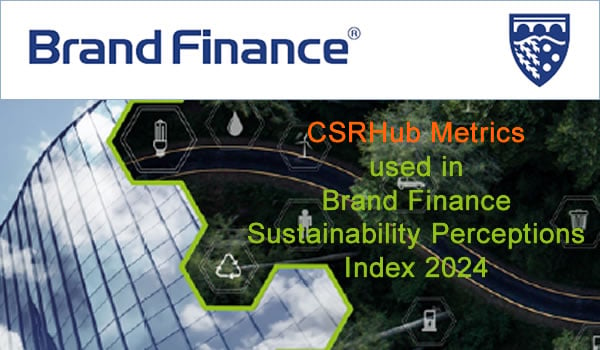Republished with permission
March 5, 2024 – New research from leading valuation firm Brand Finance, in association with CSRHub and the International Advertising Association (IAA), indicates that the world’s biggest brands are missing out on billions of dollars of potential value by failing to properly communicate their sustainability achievements and progress.
Brand Finance’s Sustainability Perceptions Index is based on a study of over 150,000 respondents across 40 countries. Key outputs include:
- the role of sustainability in driving choice in each industry
- the brands that global consumers believe are most committed to sustainability
- the financial value of a reputation for sustainability
- the value at risk, or value to be gained, arising from a gap between sustainability perceptions and performance
Apple has the highest sustainability perceptions value of any brand, USD33.3 billion. This huge sum is driven by a combination of Apple’s financial scale and supportive consumer perception. Actual sustainability performance aside, our research shows that consumers have clear confidence that Apple is committed enough to minimising its negative impacts for them continue buying and paying a premium for its products.
Microsoft has the second highest total value (USD22.7billion), along with the highest ‘gap value’ of any brand in the index - USD3.2 billion. Microsoft has engaged extensively in sustainability initiatives, including committing to becoming carbon neutral, water positive, and zero waste by 2030. Yet its communication of its commitment and progress has been somewhat muted. The implication of this is that with concerted effort to communicate its sustainability achievements more effectively, Microsoft could add over USD3 billion of value for shareholders.
Microsoft is not alone in leaving value on the table in this way – 85 brands have a positive gap value of over USD100 million, totalling USD25 billion.
At the other end of the spectrum is Tesla. Tesla is well known as a pioneer of the electric vehicles and battery technology aiding the transition to a lower-carbon economy. This image has carried across into the sustainability perceptions held by global consumers. Tesla is seen in several countries, including Mexico and the UK, as the brand with the greatest commitment to environmental sustainability. However, the strength of this perception creates its own risk; whilst Tesla performs fairly well on perceived sustainability, it falls significantly short of peer average on sustainability performance. As a result, Tesla has USD1.5 billion of value at risk.
Brand Finance’s Strategy & Sustainability Director, Robert Haigh, commented, “Brands have to strike a fine balance when communicating about sustainability. Consumers are now rightly attuned to potential greenwashing; in response, brands are becoming too precautionary and restrictive in their approach to sustainability communications. This greenhushing could reduce the incentive for competitors to improve their performance, slowing progress industry-wide. Just as importantly, these brands are letting financial go to waste, short-changing shareholders and other stakeholders in the process.”
Bahar Gidwani, Cofounder and CTO of CSRHub, commented, “This study shows how critical it is for corporate strategists and brand managers to understand how their firms are perceived by a broad array of expert sustainability-oriented stakeholders. CSRHub provides transparent access to consensus ESG ratings data to help companies improve their corporate ESG performance and realize their full value potential.”
Dagmara Szulce Managing Director, IAA Global, commented, “We see this as an incredibly potent tool to incentivize action that aligns with the UN SDGs and wider aims of the UN Global Compact. By highlighting the financial value that is contingent on sustainability perceptions, we hope to harness businesses’ profit motive, moving them past the point where they see sustainability as a ‘hygiene factor’, to a point of rapid, concerted action.”
Note to Editors
The full ranking, additional insights, charts, more information about the methodology, and definitions of key terms are available in the Brand Finance Sustainability Perceptions Index 2024.
Media Contacts
Penny Erricker
Global Press Enquires
T: +44 20 8078 3081
p.erricker@brandfinance.com
Hugh Brooks
Global Press Enquires
T: +44 20 7389 9439
h.brooks@brandfinance.com
Follow Brand Finance on LinkedIn, X (formerly known as Twitter), Facebook, and YouTube.
About Brand Finance
Brand Finance is the world’s leading brand valuation consultancy. Bridging the gap between marketing and finance for more than 25 years, Brand Finance evaluates the strength of brands and quantifies their financial value to help organizations of all kinds make strategic decisions.
Headquartered in London, Brand Finance has offices in over 20 countries, offering services on all continents. Every year, Brand Finance conducts more than 6,000 brand valuations, supported by original market research, and publishes over 100 reports which rank brands across all sectors and countries.
Disclaimer
Brand Finance has produced this study with an independent and unbiased analysis. Brand Finance accepts no responsibility and will not be liable if the publicly available information relied upon is subsequently found to be inaccurate. The opinions and financial analysis expressed in the study are not to be construed as providing investment or business advice. Brand Finance does not intend the study to be relied upon for any reason and excludes all liability to any individual, government, or organisation.
The data presented in this study form part of Brand Finance's proprietary database, are provided for the benefit of the media, and are not to be used in part or in full for any commercial or technical purpose without written permission from Brand Finance.
About CSRHub
CSRHub offers the most comprehensive global set of Consensus ESG (Environmental, Social, and Governance) ratings, information, and tools. CSRHub’s business intelligence system measures the ESG business impact that drives corporate and investor sustainability decisions. Founded in 2007, CSRHub covers 55,000 public and private companies, and provides ESG performance scores on over 35,000 companies from 135 industries in 210 countries. Our Big Data platform uses algorithms to aggregate, normalize and weight ESG metrics from 933 sources to produce a strong consensus signal on corporate sustainability performance.


